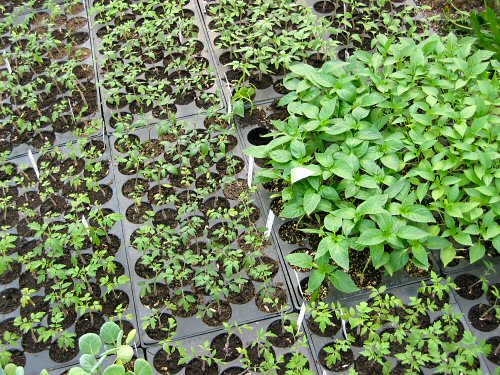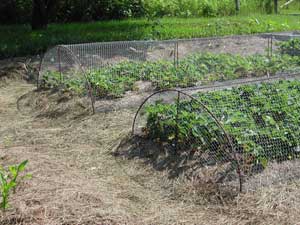Gardening- ah! The frugal person’s dream. With so many diy garden ideas out there, many have considered growing their own food, on the road to self sufficiency and money conservation. While gardening is money saving in theory, there are many common pitfalls, often making the garden a money suck instead of a money saver.
Cheap Gardening
Who’s the Gardener?
Small scale gardening for money saving reasons will probably only be worthwhile if you are able to take care of the gardening yourself. Once you need to pay workers to garden in your stead, your garden probably will end up costing you more money than you’re saving. Consider not having a garden if you don’t have the time or energy to garden yourself. If you do want to do the gardening yourself but don’t know where to start, do some research on the Traditional Gardening website to get some great tips and beginners guides.
Plant Starts
Seeds are the cheapest way to propagating your garden, but also the trickiest. If you have experience gardening and are responsible with watering, seeds are your best bet for starting out your garden. (If you have a brown thumb like I do, stay away from seeds and go with something a little more guaranteed.)
Seed sources:
- Bought at the grocery, mail order catalog, or nursery.
- Saved from fruits and vegetables you ate. Preferably with heirloom produce (genetically modified plants’ seeds don’t always germinate, and if they do, they don’t always produce fruit and if they do, it is not always the the same fruit as the parent fruit.
- Received from gardeners with extras.
 Seedlings are more expensive than seeds but worthwhile if you’re a plant killer like myself. Newly sprouted seeds need a lot of loving and can die easily; older plants are a bit hardier. Seedlings are a worthwhile choice only if you’ll be on top of watering them. Dead plants don’t save money. Buy these from a nursery, grocery, or see if any local gardeners have extras.
Seedlings are more expensive than seeds but worthwhile if you’re a plant killer like myself. Newly sprouted seeds need a lot of loving and can die easily; older plants are a bit hardier. Seedlings are a worthwhile choice only if you’ll be on top of watering them. Dead plants don’t save money. Buy these from a nursery, grocery, or see if any local gardeners have extras.
Cuttings. The more experienced gardener can take cuttings from a previous plant, let it root in water (either with or without rooting hormones) and then plant the cutting in the ground. This is not for the novice gardener.
Watering
Water can be expensive, especially if you live in a droughty area and especially if you’re using lots of water to water your garden.
Water Sources:
- Saved dish water. Stop up the sink while washing dishes. Use a large cup or container to transfer this water into a bucket. Use this bucket to water the garden.
- Bath water. Stop up the tub while showering. Transfer this water to buckets and use for irrigating.
- Laundry water. Instead of the washing machine pouring the grey water down the drain, remove the pipe and place it in a large garbage can or barrel. This much water will be difficult to carry, so either keep the container on a dolly, or transfer to buckets to bring to the garden.
- Rain barrels. Placed under gutters, these barrels will catch all the rain that would otherwise be wasted, and helps you use it for other purposes.
- Mulch. Keep the ground covered and the water will evaporate slower, lessening the need for water.
- Living mulch. Try companion planting, such as the three sister’s method. The close proximity of the plants will prevent evaporation and be more efficient with water.
- Plant together. Many plants grown close to each other will use less water than watering fewer plants further apart.
- Ollas. Unglazed pottery buried in the ground with just the opening above ground allows water to seep into the ground over long periods of time, similar to drip irrigation systems. Unlike drip irrigation systems, you can fill ollas with old dishwater and laundry water.

The cost of gardening equipment can be quite prohibitive. With a little extra effort, you’ll be able to get all you need for gardening without spending too much money.
Dirt. Scratch the vermiculite and peat moss. They’re quite expensive. Compost works well enough (according to the author of Square Foot Gardening) and is much cheaper. Or you can make your own compost from kitchen scraps.
Pots. Old buckets can be rescued from the trash for use as large plant containers. Yogurt and cottage cheese containers work well as mid-size plants. Egg cartons work great for growing seedlings.
Tools. Try moving sales, garage sales, and thrift stores before buying these new. You may strike lucky.
Pest Control
Watching your hard work getting eaten by pests is very frustrating. I should know- our rabbits escaped and ate up our swiss chard in our old apartment.
Protect From Animals. Build cages from chicken wire and piping or wood to protect from rabbits and other crawling pests. Use draped netting to protect from birds.
Protect From Bugs. Read up on these; there are many different methods, depending on which bugs are eating your plants. Slugs can be deterred with egg shells, aphids can be eaten up by lady bugs, other bugs are deterred by certain flowers. Google is your friend, as are gardening forums.
Knowledge.
The most important thing you can do to save money in your garden is to arm yourself with knowledge. Read up on the different plants you’re buying, find out what conditions they need.
Do they need shade? Partial shade? Full sun?
Learn the correct growing season for different plants so you don’t get them killed by extreme temperatures. Do they need special conditions for germinating?
How much water do your different plants need? Remember, each plant has different needs. Some will be killed by too much water, others will be killed by too little.
Take Responsibility
If you forget to water the plants on a regular basis, set a reminder alarm so your plants don’t shrivel up in the sun. You don’t want all your hard work to be for naught if your negligence kills all your plants.
Start Small
If you’ve never gardened before, you may not know much about gardening. You may inadvertently kill most of your plants on the first go, or may simply decide that you don’t enjoy the physical labor required.
 You may give up gardening after buying 20 different seed packages (like some blogger who won’t be named).
You may give up gardening after buying 20 different seed packages (like some blogger who won’t be named).Just… start small. If you like it, expand your garden. If not, you won’t be stuck with packages and packages of unused and unwanted seems (ahem, Penny).
Good luck with your garden! Me- I’ll just stick with growing green onions on my windowsill.
Have you gardened? How much money have you spent on your garden? How much money have you saved by gardening? Is your garden a money saver or a money suck? What are your money saving tricks for your garden?
Part of Frugal Friday, over at Life as Mom.




I love this post. Too many people spend way to much while gardening. If it costs more to grow the produce than it would to buy them, its not worth the effort.